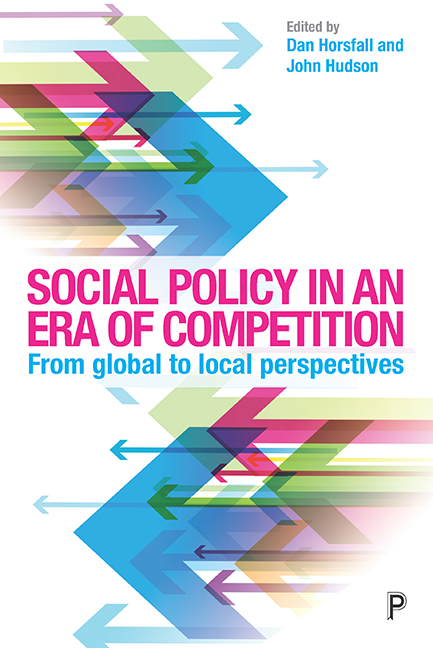Book contents
- Frontmatter
- Contents
- List of figures, tables and boxes
- List of contributors
- List of abbreviations
- Introduction: social policy in an era of competition
- Part One Global competition as the context for welfare
- Part Two The impact of intensifed competition on local governance
- Part Three The reframing of welfare discourses in an era of competition
- Part Four Conclusions
- References
- Index
six - Exporting healthcare services: a comparative discussion of the UK, Turkey and South Korea
Published online by Cambridge University Press: 05 April 2022
- Frontmatter
- Contents
- List of figures, tables and boxes
- List of contributors
- List of abbreviations
- Introduction: social policy in an era of competition
- Part One Global competition as the context for welfare
- Part Two The impact of intensifed competition on local governance
- Part Three The reframing of welfare discourses in an era of competition
- Part Four Conclusions
- References
- Index
Summary
Introduction: exporting public services
Since the early 1990s the purchaser/provider split and marketisation have encouraged state organisations across many OECD countries to look to private sector and not-for-profit providers as potential sources of service provision, with competition for state funds in a ‘mixed economy of welfare’ (Mause, 2009). As such, state strategy switches from providing, to purchasing from private and non-public providers. As these markets develop and competition is embedded in public services we are seeing the emergence of a new ‘public services industry’ that differs from the traditional agenda of the public sector and involves the commodification of public sector work (Huws, 2008; Gash et al, 2013). One example of such marketisation is the role of non-NHS providers in delivering NHS-funded care in England, a direction of travel that, politically, has proved particularly controversial. Previously there was a limited role for non-NHS providers in delivering NHS-funded care; however, from 2008 the ability of non-public providers to compete for public contracts increased, culminating in the Any Qualified Provider policy from 2012, where NHS patients were given the right to choose to have certain routine treatments performed at any hospital, including private sector hospitals (Arora et al, 2013, p 14; BMA, 2013).
The emphasis on such marketisation is the result of wide-ranging and deep-reaching economic, social and political challenges and is leading to new forms of service delivery and governance across a range of public services (including health, social care, education, probation and childcare). Such stimulation of public service markets generates dividends that flow offshore, given that an increasing proportion of shareholders in UK companies are overseas investors. Public services are also provided in the UK by transnational providers: Sodexo, a French-based company is contracted to deliver probation services; Ingeus, the largest provider within the Work Programme that supports jobseekers back into employment, is owned by a US company; the French company Atos was contracted to deliver Work Capability Tests for disabled welfare beneficiaries – a contract subsequently awarded to Maximus, an American for-profit provider (Social Enterprise UK, 2012; NAO, 2013; Plimmer, 2014a; 2014b; TUC and NEF, 2015).
- Type
- Chapter
- Information
- Social Policy in an Era of CompetitionFrom Global to Local Perspectives, pp. 103 - 116Publisher: Bristol University PressPrint publication year: 2017

